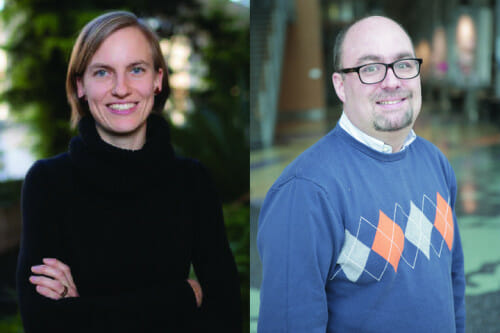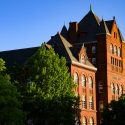Inaugural Bassam Z. Shakhashiri Public Science Engagement Award recognizes excellence in outreach

Zuzana Buřivalová, left, and Andrew Greenberg, winners of the inaugural Bassam Z. Shakhashiri Public Science Engagement Award
A conservation scientist with a goal of finding ways to equitably protect tropical forest biodiversity and a teaching faculty member whose outreach work has led to a method for teaching visually impaired students about nanotechnology have received the University of Wisconsin–Madison Bassam Z. Shakhashiri Public Science Engagement Award.
“The selection committees have named Zuzana Buřivalová and Andrew Greenberg the inaugural award recipients and I join in offering my congratulations,” says the award’s namesake, Bassam Z. Shakhashiri, emeritus professor of chemistry and the William T. Evjue Distinguished Chair for the Wisconsin Idea, who became part of the UW faculty in September of 1970 and retired in September 2021.
The award, named in honor of Shakhashiri’s “Science is Fun” philosophy and long-term commitment to science education and public engagement, recognizes UW–Madison faculty and academic staff (one awarded to each category) who have shown excellence in engaging the public in their work in STEAM (Science, Technology, Engineering, Arts and Math) research.
“The hallmarks of UW–Madison are scholarly research, classroom teaching and public engagement,” Shakhashiri says. “Our discoveries help satisfy curiosity. We nourish personal growth and development. We cultivate creativity. We foster community appreciation of science. We work to advance knowledge and to serve society.”
Greenberg is a distinguished teaching faculty member in the Department of Chemical and Biological Engineering, and Buřivalová is a professor with affiliations in the Department of Forest and Wildlife Ecology, the Nelson Institute for Environmental Studies and the Center for Sustainability and the Global Environment.
“The Wisconsin Idea is an important feature of who we are as members of UW–Madison, and the Bassam Shakhashiri Public Science Engagement Award is one way to recognize those who live this concept.”Steve Ackerman
As principal investigator of the Sound Forest Lab, Buřivalová leads a group of researchers using soundscapes – all the sounds that can be heard in a landscape – to understand the health of rainforests. The Sound Forest Lab collaborates with non-governmental organizations, governments and local communities to design research projects that can help on the ground.
Through its research, the lab creates recordings of “beautiful, unique and sometimes strange soundscapes,” Buřivalová says, and uses these soundscapes “beyond the science” to inspire people to listen more to the natural world and foster curiosity about the sounds they hear in nature.
“Making science engaging and fun for everyone, especially children, is something that I spend a lot of my free time on, and so it is wonderful to be recognized for this effort,” Buřivalová says. “The award will enable me to pursue further collaborations with artists – both visual artists and musicians – to bring conservation science and tropical forests closer to people living in cities.”
Greenberg teaches Chemical Engineering in the Community, an outreach-focused course he designed to help undergraduate and graduate students learn to communicate STEM research in chemical and biological engineering.
He is also the education and outreach leader for the U.S. Department of Energy-funded Center for the Chemical Upcycling of Waste Plastics; leads education and outreach efforts for multiple National Science Foundation projects; and serves as the education and outreach advisory board member for the NSF National Nanotechnology Coordinated Infrastructure, a consortium of 16 university nanotechnology cleanroom facilities.
He has also served as the associate director of the Institute for Chemical Education, where he led outreach efforts and co-directed education and outreach for the UW–Madison Nanoscale Science and Engineering Center.
“UW–Madison is at the epicenter of STEAM engagement — faculty and staff believe in the Wisconsin Idea and the importance of sharing the university and its work beyond campus boundaries,” says Greenberg, who adds he is honored to be selected for the award. “I am truly fortunate to work at an institution that not only supports public engagement with science but celebrates individuals who are passionate about the importance of this work.”
Shakhashiri is well known internationally for his leadership promoting excellence in science education at all levels; for his commitment to engaging the public with science; and for his development and use of demonstrations to teach chemistry in classrooms and in public settings, such as museums, convention centers, shopping malls and retirement homes.
“Science and society have what is essentially a social contract that enables great intellectual achievements but comes with mutual expectations of benefiting the human condition and protecting our planet,” Shakhashiri says. “We must ensure that the next generation of scientists is both highly skilled technically and properly educated to carry on their scientific and educational work for the common good of society. Long live the Wisconsin Idea in the 21st Century.”
Shakashiri is, Greenberg says, “the embodiment of the Wisconsin Idea and a long-time advocate for faculty and staff to engage our communities and share our passions for STEAM. Through his efforts and the efforts of other faculty and staff at UW–Madison, there is a community of scientists and engineers who believe that their work does not stop in the laboratory and it extends to engaging the public in the work of the university.”
The award is supported by the Wisconsin Alumni Research Foundation, the Morgridge Institute for Research and UW–Madison’s Office of the Vice Chancellor for Research and Graduate Education.
“The Wisconsin Idea is an important feature of who we are as members of UW–Madison, and the Bassam Shakhashiri Public Science Engagement Award is one way to recognize those who live this concept,” says Steve Ackerman, vice chancellor for research and graduate education.



